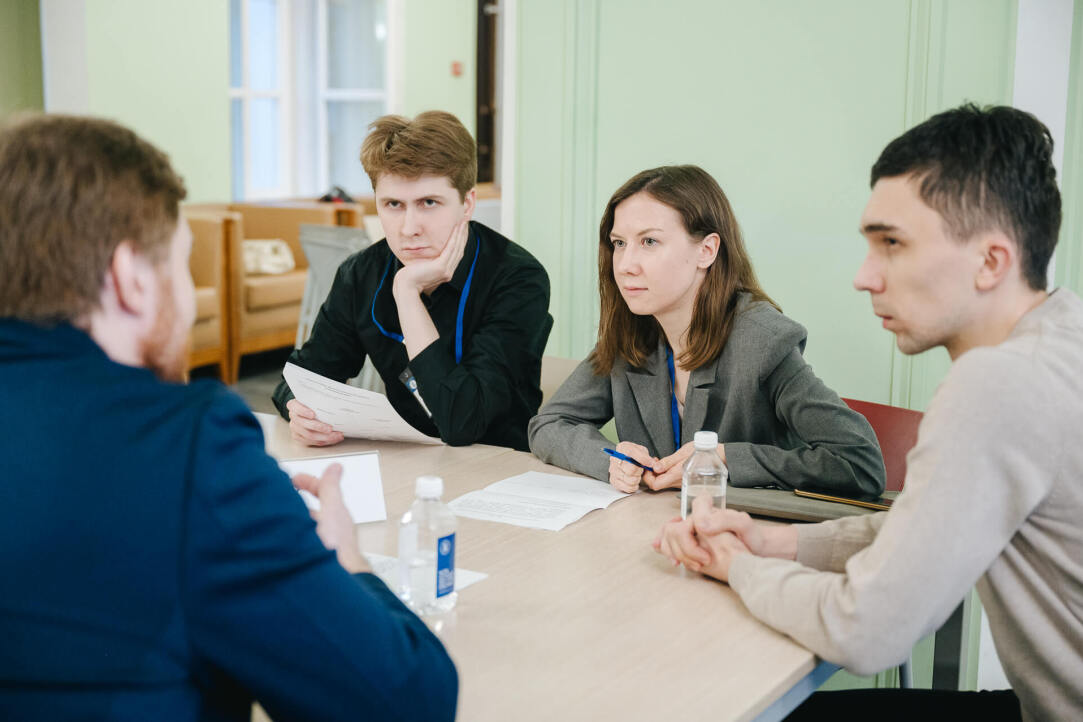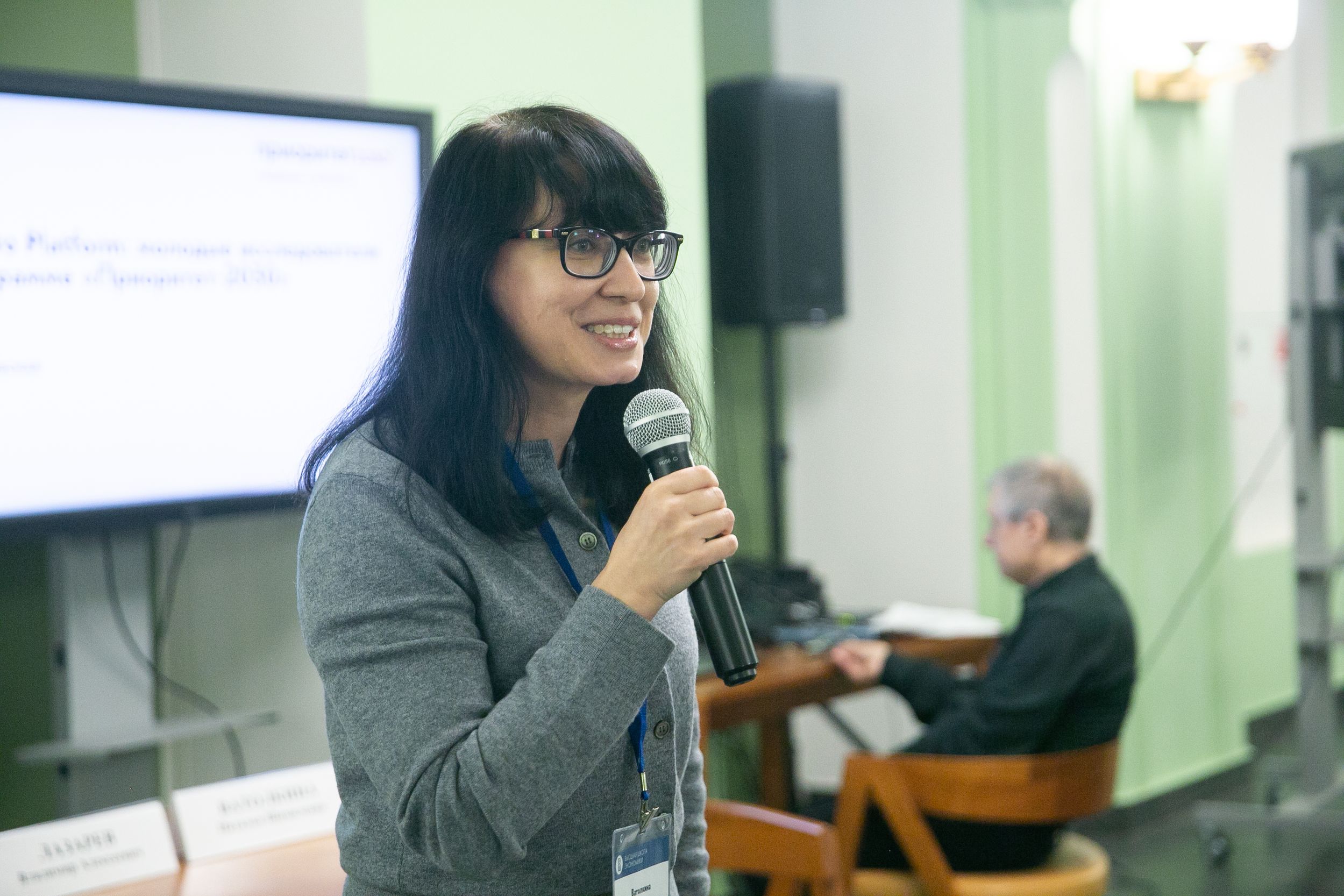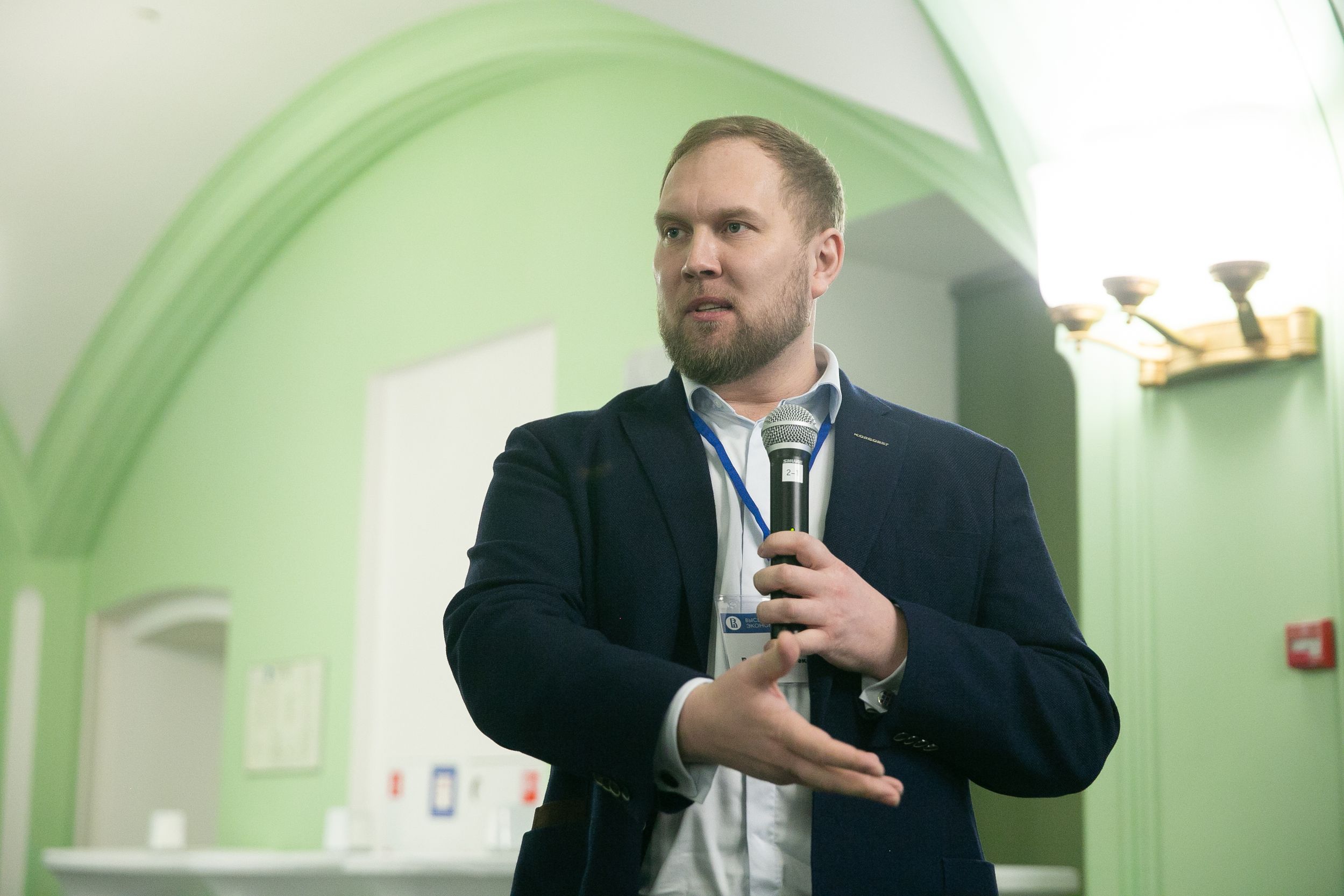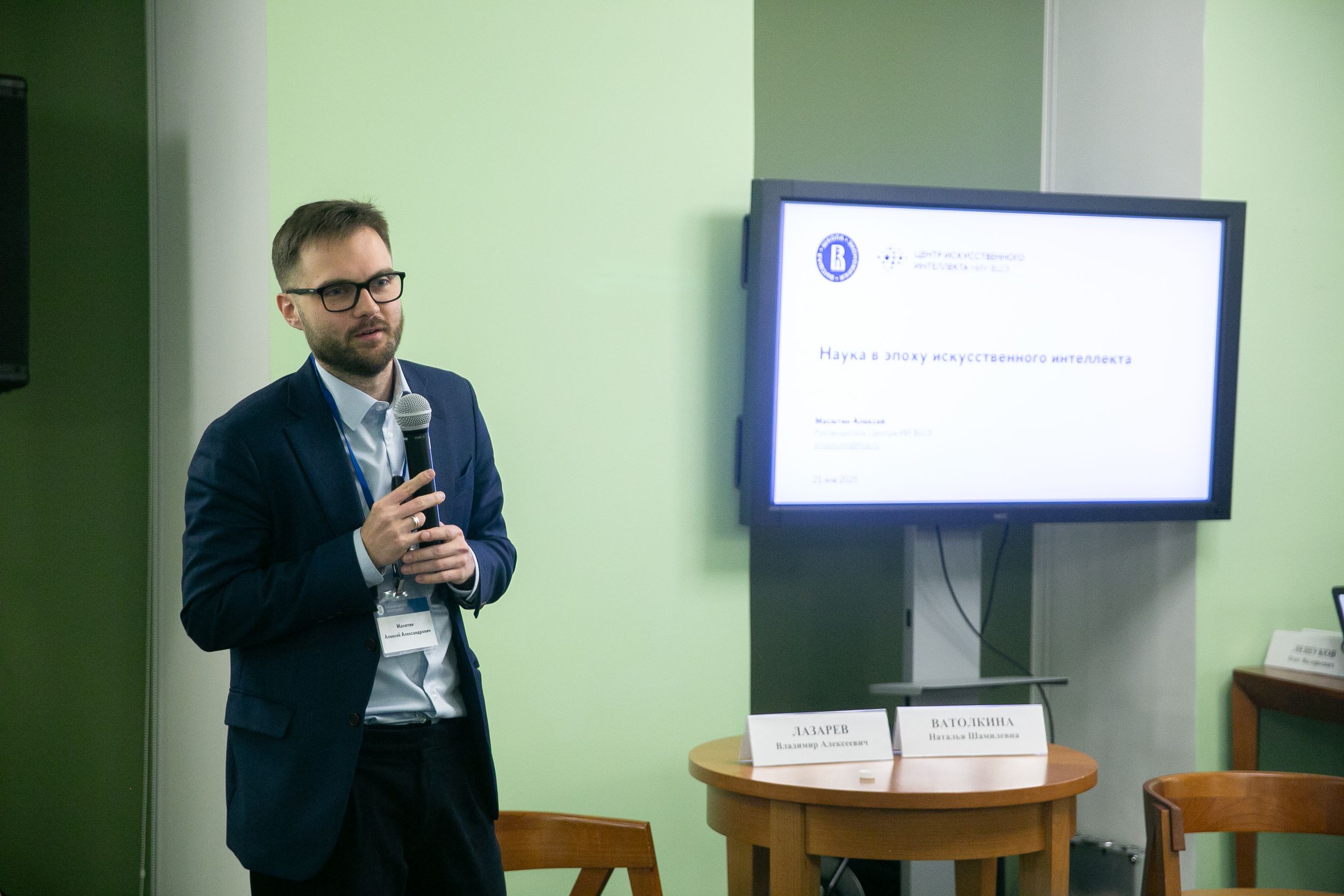New Science: How Early-Career Researchers Reach New Heights

In the context of increasing global competition, countries are striving to ensure technological sovereignty. Those who can ensure economic development and concentrate intangible assets and human capital are emerging as leaders. The growing demand for qualified staff leads to an increase in the role of universities and the demand for early-career scientists. The challenges and opportunities for prospective specialists in the scientific community were discussed at the ‘StratPro Platform’ strategic session at HSE University.
On January 29, HSE University hosted the strategic session ‘StratPro Platform: Early-Career Researchers in the Priority 2030 Programme.’ Opening the event, Natalia Vatolkina, HSE Deputy Vice Rector, spoke about the Priority 2030 Federal Academic Leadership Programme and the strategic projects implemented by the university under this programme. Strategic projects are portfolios of thematically linked research initiatives that integrate social sciences, humanities, and digital sciences and contribute to the transformation of the university's research and innovation activities. In 2024, over a thousand researchers participated in the implementation of five strategic projects, with the total amount of funding exceeding 250 million roubles.

Natalia Vatolkina stressed that the number of projects supported on a competitive basis is increasing every year. Early-career research project competitions to implement strategic projects have been held since 2022. In 2024, the process for selecting such projects was significantly updated and standardised for all strategic projects and HSE campuses. The competition committee supported 24 projects out of the 45 applications received during the 2024 competition. Half of the supported projects were led by doctoral students and undergraduates, and the average share of early-career researchers, undergraduates, and doctoral students in supported teams exceeded 85%.
‘HSE University provides quite a lot of support programmes for undergraduate, graduate, and doctoral students. These include the Science Republic community, Science Battles, various research competitions, intensive courses, and an academic development programme. Early-career research project competitions in the framework of strategic projects complements these programmes,’ says Natalia Vatolkina.

The involvement of early-career scientists in solving pressing tasks related to social and national development is a priority of the Decade of Science and Technology announced by Russian President Vladimir Putin. Vladimir Lazarev, member of the Coordinating Council for Youth in Science and Education under the Russian President's Council for Science and Education, spoke about key areas of the council’s work in forming an effective system for involving young people in research and development, and also shared his own research experience and work in the Coordinating Council.
Speaking about the most important elements, he recalled the Science-ID platform for early-career scientists (which consolidates information on measures to support prospective scientists in Russia, including scientific volunteering and popular science tourism), the Nasha Laba catalogue of scientific equipment and consumables, the ‘President, I have an idea!’ one-stop shop service for initiatives in scientific and technological development in Russia, and others. In total, there are about 280 measures of support for early-career researchers in Russia, including awards from regional governments, research grants, scholarships for scientific achievements, housing certificates, various benefits, internships, and more. The audience showed particular interest in initiatives to create communities of early-career scientists, including the ‘Youth Laboratories’ and ‘School for Early-Career Researchers’ projects, which will be developed in 2025. Vladimir Lazarev urged his colleagues to be persistent in their initiatives and emphasised the importance of effective communication between researchers, the government, and society.
‘Pay attention to popular science projects. As scientists, we need to tell the public about our research, and it also helps us find like-minded people,’ said Vladimir Lazarev.

Alexey Masyutin, Director of the AI and Digital Science Institute, discussed the increasing role of artificial intelligence technologies in science with early-career researchers. He presented the most striking examples of the use of AI in applied research, including innovative methods of protein generation and the latest methods for assessing the risks of various diseases. He highlighted the role of AI in fundamental science, giving an example of using a digital model of the muon magnetic reflector for the Large Hadron Collider. The speaker concluded by talking about the development of AI assistants for students and study offices, as well as AI assistants for accurately summarising scientific topics—something useful to researchers.
As part of the ‘My Project in the Priority 2030 Programme’ discussion platform, HSE early-career scientists spoke about their own research experience.
Centre for Language and Brain Research Fellow Olga Buivolova, who led a project on noninvasive brain stimulation to correct speech disorders, spoke about her journey from research assistant to a team leader who participated in two of the university’s strategic projects.
Anna Provorova, Junior Research Fellow at the Centre for Cognitive Neuroscience (HSE University in Perm), presented the NeuroSkate neural network for analysing the movements of young athletes during figure skating training, which is designed to improve the effectiveness of teaching in children's sports schools.
Anastasia Andreeva, Head of the Laboratory for Educational Innovation Research at the Institute of Education, shared her own experience of becoming an early-career manager and gave some practical tips to the participants.
Olesia Maibakh, Head of the Foresight Research Methodology and Organisation Unit at HSE ISSEK, presented the results of an analysis of the possibilities of using science-fiction methods to develop long-term forecasts of scientific, technological, and socio-economic development, sharing the plans of the research team and telling colleagues about the pitfalls of planning.
The session organisers paid special attention to the commercialisation of the scientific achievements of early-career researchers. Andrey Zizin, Deputy Senior Director for Financial Affairs, Associate Professor at the School of Innovation and Entrepreneurship, conducted a master class on the most important aspects of a successful commercialisation project, common errors, and measures to support research entrepreneurship at HSE University.
‘A commercialisation project doesn’t have to be at the same level of readiness on all scales at the same time or to advance symmetrically. However, large differences can become an obstacle to progress in entering the market with a new product and increase the risk of failure,’ explained Andrey Zizin.
The participants had an opportunity to put their knowledge into practice during the discussion session ‘Commercialisation of the Achievements of Early-Career Researchers: Brain Storm,’ during which interdisciplinary teams discussed research initiatives and determined the main obstacles to their commercialisation. During the brainstorming session, the participants defined ways to overcome these barriers both by stimulating the initiative of research teams and through support from the university, including the creation of a one-stop shop for packaging and promoting innovative products, a knowledge base and an AI assistant in the field of commercialisation, and more. The participants discussed their findings with invited experts, including Andrey Zizin; Anton Yanovsky, Director of the Centre for R&D Commercialisation and Technology Transfer; and Konstantin Sinyavsky, Director of the Legal Support Centre for Research Activities, Intellectual Property and Data Protection.
In the final part of the strategic session, Yulia Milshina, Senior Research Fellow at the International Research and Educational Foresight Centre at HSE ISSEK, spoke about global trends in scientific and technological development, their connection with current economic and social changes, as well as Russia's priorities in the new environment. Noting among the main challenges the ‘rising cost’ of science, the growth of scientific inequality between countries and the deglobalisation of science in favour of the formation of techno-economic blocs of countries, she stressed that the main barrier to the development of science is the shortage of personnel and the level of competence. The ability to produce highly qualified scientific personnel will be a key factor in the competitiveness of countries in the coming decades.
‘The requirements for the quality of staff, for training and retraining of personnel are growing many times. Your efforts, enthusiasm, and energy are aimed at the greatest goals, and I would like to wish you breakthroughs and interesting results so that this interest does not fade,’ said Yulia Milshina.
At the end of the strategic session, Natalia Vatolkina presented certificates to the winners of the 2024 Early-Career Research Project Competition, who carried out research within the framework of all five strategic HSE projects.
See also:
HSE Scientists Optimise Training of Generative Flow Networks
Researchers at the HSE Faculty of Computer Science have optimised the training method for generative flow neural networks to handle unstructured tasks, which could make the search for new drugs more efficient. The results of their work were presented at ICLR 2025, one of the world’s leading conferences on machine learning. The paper is available at Arxiv.org.
Neural Network Trained to Predict Crises in Russian Stock Market
Economists from HSE University have developed a neural network model that can predict the onset of a short-term stock market crisis with over 83% accuracy, one day in advance. The model performs well even on complex, imbalanced data and incorporates not only economic indicators but also investor sentiment. The paper by Tamara Teplova, Maksim Fayzulin, and Aleksei Kurkin from the Centre for Financial Research and Data Analytics at the HSE Faculty of Economic Sciences has been published in Socio-Economic Planning Sciences.
Larger Groups of Students Use AI More Effectively in Learning
Researchers at the Institute of Education and the Faculty of Economic Sciences at HSE University have studied what factors determine the success of student group projects when they are completed with the help of artificial intelligence (AI). Their findings suggest that, in addition to the knowledge level of the team members, the size of the group also plays a significant role—the larger it is, the more efficient the process becomes. The study was published in Innovations in Education and Teaching International.
Advancing Personalised Therapy for More Effective Cancer Treatment
Researchers from the International Laboratory of Microphysiological Systems at HSE University's Faculty of Biology and Biotechnology are developing methods to reduce tumour cell resistance to drugs and to create more effective, personalised cancer treatments. In this interview with the HSE News Service, Diana Maltseva, Head of the Laboratory, talks about their work.
Master’s Students of HSE, University of Campinas, and Tsinghua University Publish Joint Student Research Collection
Master’s students of the HSE ISSEK programme ‘Science, Technology and Innovation Management and Policy’ have released a joint research collection with the University of Campinas (Brazil) and Tsinghua University (China) titled ‘Being Innovative or Being on the Safe Side—Managing the Risk of Failure.’ The authors explore how organisations perceive risks and embrace innovation within different cultural contexts.
‘A Turn Away from Stereotypes’: Moscow Hosts ‘Researching the Deaf Community’ Conference
On October 17–19, 2025, the third annual interdisciplinary conference ‘Researching the Deaf Community 2025: on the Periphery of Attention’ took place at GES-2 House of Culture in Moscow. The event was organised with the participation of the HSE International Laboratory for Social Integration Research. HSE University Vice Rector Irina Martusevich addressed attendees at the opening ceremony.
Exploring the Mind: HSE Scientists Discuss Cognitive Technologies of the Future
Why we make irrational decisions, how the brain responds to fakes, and whether neural networks are capable of thinking—these were the topics discussed by early-career scientists of HSE University during the NAUKA 0+ science festival. The event brought together students and experts from various fields, united by a common goal—to deepen their understanding of the human brain and cognitive technologies.
HSE Researchers Assess Creative Industry Losses from Use of GenAI
Speaking at the IPQuorum.Music forum on October 15, Leonid Gokhberg, HSE First Vice Rector, and Daniil Kudrin, an expert at the Centre for Industry and Corporate Projects of HSE ISSEK, presented the findings of the first study in Russia on the economic impact of GenAI on creative professions. The analysis shows that creators’ potential losses could reach one trillion roubles by 2030.
International Dialogue on Urban Development: Dynamic Urbanism and Green Infrastructure
In September 2025, the HSE Faculty of Urban and Regional Development (FURD) hosted a delegation of leading scholars and urban development experts from China. Two seminars were held at the Shukhov Lab with the participation of Chinese colleagues: the first focused on green infrastructure, while the second explored the theme of dynamic urbanism. In addition, a meeting between the Chinese delegation and representatives of FURD took place at the university’s main building on Pokrovsky Bulvar. The participants discussed opportunities for expanding cooperation between universities and research centres.
HSE Tops the Ranking of Universities with the Best Employer Reputation
On October 16, 2025, Forbes Education published its list of the top 20 Russian universities with the best employer reputation in 2025. The ranking was based on a survey of leading Russian employers, who named the higher education institutions whose graduates they consider the most well-prepared and are most inclined to hire. HSE University took first place in the ranking.


